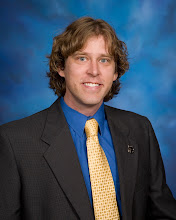Working with freshmen will be different than teaching upperclassman who perhaps have a higher maturity level.
 I will have high behavior expectation of these students just like they do at the Johnson Space Center (see the poster to the left).
I will have high behavior expectation of these students just like they do at the Johnson Space Center (see the poster to the left).Also I'm excited to see if this can positively impact PSAT scores. Freshmen who are taking geometry may be able to keep some of their algebra skills fresh because of various activities in my class. We will be using the TI-Nspire in class most every day for data collection, explorations, and formative assessment. We have a classroom set of TI-Nspire CAS so that even if students don't have an Nspire yet, they will be ready to participate. I think we'll even use our TI-Nspire Navigator to ask 'class opener' questions from PSAT practice and Indiana's Algebra End-of-Course Assessment (ECA) sampler.
There is a real need for young people to take science, technology, engineering, and mathematics (STEM) courses. For example, a 2009 press release reports that “the current graduation rate from U.S. university electric power engineering programs is not sufficient to meet our nation’s current and future needs.” It goes on to say, "The bad news is that enrollment in electric power and engineering programs are not rising fast enough, and interest in science, math and technology is low in K-12 students. Enrollments are declining in electrical engineering in general. Among students, teachers, guidance counselors and parents, engineering is ranked low on the list of interesting and attainable professions. Furthermore, women are especially underrepresented in the industry and as students."
The following facts were listed at the start of a STEM video found here.
 Additionally, recently I came across an article about the top 6 degrees ranked in terms of employment, by Chris Kyle. "Corporate consulting firm Challenger, Gray & Christmas polled 100 human resource professionals to find out what graduating students this year can expect from the job market in 2010, and, specifically, which degrees have the best odds of helping students get jobs....
Additionally, recently I came across an article about the top 6 degrees ranked in terms of employment, by Chris Kyle. "Corporate consulting firm Challenger, Gray & Christmas polled 100 human resource professionals to find out what graduating students this year can expect from the job market in 2010, and, specifically, which degrees have the best odds of helping students get jobs....#5 - Engineering Degree
It might surprise you to learn that engineering degrees are ranked fifth in terms of employment - and not first - but don't start feeling sorry for engineers just yet. According to a survey by the National Association of Colleges and Employers, eight of the top 10 best-paid majors are in engineering.
Desirable Degrees:
Biomedical Engineering
Civil Engineering
Electrical Engineering
Mechanical Engineering Network Engineering and Administration
Network Engineering and Administration
Programming and Software Engineering
Average Starting Salaries:
Petroleum Engineering: $86,220
Computer Engineering: $60,879
Mechanical Engineering: $58,392"
Of course, the real reason you pursue something isn't for the pay (note: I am a teacher), but because you have a passion for it, because you enjoy it, yea, because you recognize God has given you a talent with it. I recently heard a NASA engineer say, "Most jobs in engineering have higher pay but none are as cool as my job."
Even if you have a gift or talent with something, that doesn't mean it will be the easy for you to do that job all the time. Gifted musicians must practice hard and long. This is true of mathematicians, scientists, teachers, etc. For more about ability and 'talents' read this.


3 comments:
something didn't look right....
typo....biblically
Keep up the great blog.
biblical |ˈbiblikəl| (also Biblical) (abbr.: bibl. or Bibl.)
adjective
of, relating to, or contained in the Bible : the biblical account of creation | biblical times.
• resembling the language or style of the Bible : there is a biblical cadence in the last words he utters.
• very great; on a large scale : they see themselves as victims of almost biblical dimensions.
DERIVATIVES
biblically |-ik(ə)lē| adverb
Thanks.
Hi Sean
We have been a 'physics first' school for many years. My algebra one students are using Nspire CAS and the physics teachers are using mathematica for labs, note taking, tests, everything. I try to find as many similarities as possible between mathematica and nspire to help them learn to learn. Good luck with physics first!
Ellen Browne
Post a Comment